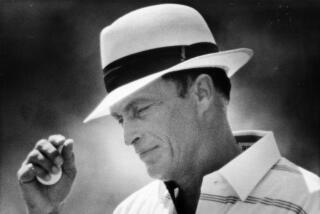From despair, words of hope
WHEN “Always Running” came out in 1993, its author -- the poet, novelist and Chicano activist Luis J. Rodriguez -- hoped that this gripping memoir of his career as a gang-banger in poverty-riddled East Los Angeles would dissuade his troubled teenage son, Ramiro, from la vida loca.
Since then, the author reports, “more of my homies from 30 years ago have died,” and Ramiro is serving a 28-year prison sentence for three counts of attempted murder. Meanwhile, Rodriguez’s graphic and unvarnished account of “stealing, shootings, stabbings, arrests, homelessness, drug use and overdoses” has become one of the nation’s 100 most widely banned books, according to the American Library Assn.
“Always Running,” reissued this month by Simon & Schuster, traces his path “from victim to perpetrator to witness to revolutionary.” In a new introduction, Rodriguez writes: “The fact is I failed at everything I tried to do, but I kept working at it, failing some more, not giving up, so that eventually, at age 51, I’ve begun to center my life, get control over my destructive impulses, and become someone my wife, my kids, my grandchildren, and my community can learn from and respect.”
Curbstone Press also has published a collection of Rodriguez’s new and selected poetry, “My Nature Is Hunger.” The poems here follow him from the barrios of Los Angeles to inner-city Chicago to the Navajo Reservation -- and back to the streets of Southern California in support of striking janitors. “Die and live,” he writes in “Suicide Sweet,” “[W]e need more poems.”
Kristina Lindgren
*
From ‘My Nature Is Hunger: New and Selected Poems: 1989-2004’
From “The Rabbi and the Cholo”
One night, at a “brotherhood” camp,
the Rabbi
witnessed me break down, for the first
time
since I was eleven: I mourned for all
the dead homies, for the women who
walked,
for family and the wounds of silence.
The Rabbi sat down next to me and
said:
“I don’t know how to cry like that.”
“The Monster”
It erupted into our lives:
Two guys in jeans shoved it through the
door
heaving & grunting & biting lower lips.
A large industrial sewing machine.
We called it “the monster.”
It came on a winter’s day,
rented out of mother’s pay.
Once in the living room
the walls seemed to cave in around it.
Black footsteps to our door
brought heaps of cloth for Mama to
sew.
Noises of war burst out of the living
room.
Rafters rattled. Floors farted
the radio going into static
each time the needle ripped into fabric.
Many nights I’d get up from bed,
wander squinty-eyed down a hallway
and peer through a dust-covered
blanket
to where Mama and the monster
did nightly battle.
I could see Mama through the yellow
haze
of a single light bulb.
She slouched over the machine.
Her eyes almost closed.
Her hair in disheveled braids;
each stitch binding her life
to scraps of cloth.
“Untitled”
An abandoned adobe hut, crumbled
Walls, gaps in roof, glassless window
openings,
Dirt floor with wine bottles, aerosol
Spray cans and soiled newspapers
Pushed up against the corners.
My Navajo friend called it “The
Battered Husband Shelter.”
“¡Si, Se Puede! Yes, We Can!”
Beneath steel and concrete,
Beneath night’s wandering shadow,
Come the eyes, voices and arms --
elbows and knees --
That make buildings shine, magnifying
the sun into all our faces.
The nameless, the scorned, the ignored
-- yet
They are the humanity that makes
human things work.
Mothers and children, fathers and
uncles, family and family --
They come to make this city dance, the
rhythm of what’s just,
What is secure -- the dance of strike
and protest,
demand and dignity.
They toil inside these glass temples --
they clean them --
The truly human who now step into the
streets,
into our tomorrows,
And declare: ¡Basta! Enough! What
we clean, we also make sacred.
More to Read
Sign up for our Book Club newsletter
Get the latest news, events and more from the Los Angeles Times Book Club, and help us get L.A. reading and talking.
You may occasionally receive promotional content from the Los Angeles Times.







